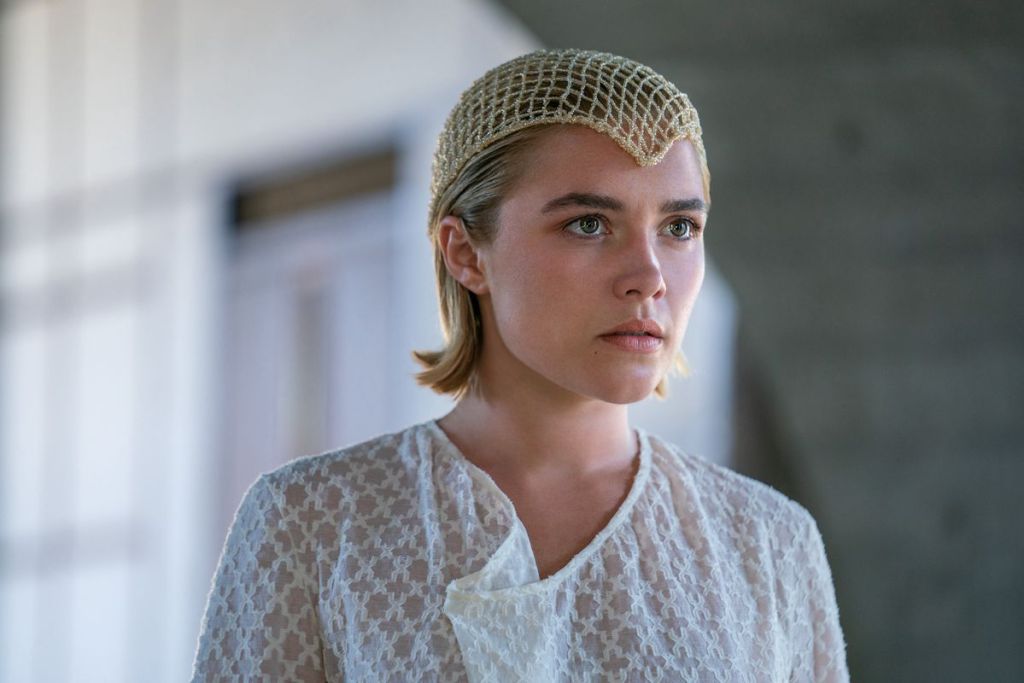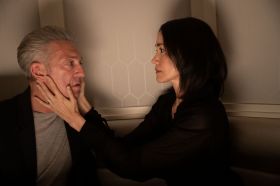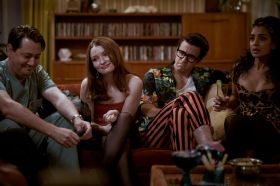Coming out of the first Dune, anyone familiar with the novel – or David Lynch’s uneven but underrated 1984 adaptation – had a few questions about what Dune Part Two would hold. For one, the first film had used up most of the plot, leaving little more than an escalating series of battles and the growing misgivings of Paul Atreides (Timothée Chalamet) to fill the back half. How would director Denis Villeneuve turn that thin gruel into an epic worthy of the name?
Rather than simply pad things out with fresh subplots or new characters (though Dune Part Two does feature both), Villeneuve doubles down on going big. Call it a vibes-based approach to storytelling: overwhelming visuals and a pummelling score work hard to give this a constant bone-deep sense of profundity and meaning even where the story itself is just a series of rebel attacks on farm trucks.
As for the story: now hiding out with a band of Fremen led by Stilgar (Javier Bardem) Paul and his pregnant mother Lady Jessica (Rebecca Ferguson) – the last survivors of House Atreides, sent to rule the economically vital planet Arrakis as part of what turns out to have been a murderous trap laid by the Emperor (Christopher Walken) and rival House Harkonnen – gradually come to be accepted by them and are initiated into their desert ways.
Spice, potions, and propaganda
Lady Jessica becomes a Reverend Mother, a figure of much power, while Paul grows into the role of warrior and leader (he also gets to ride around on giant sand worms, who move like fast-swimming whales barely breaching the surface). Some see him as the foretold messiah, a mantel he struggles against – mostly because he knows the belief’s origins in manipulative propaganda spread by the Bene Gesserit, the secretive and powerful sisterhood his mother is a member of.
While the Harkonnens, now back in charge of the planet, alternate between sending out raiding parties and killing their own underlings, under Paul’s leadership the Fremen’s attacks on Spice production grow bolder and more effective. The call grows for Paul to travel south and drink the Water of Life, a potion that usually kills men but may – if the prophecy is true – give him the visions he needs to free the planet.
Already Paul knows going south will lead to a galaxy-wide war that will kill billions. When the Harkonnens bring in the even more ruthless Feyd-Rautha (Austin Butler) to crush the resistance, he may no longer have a choice.
Read: ScreenHub review of Dune: Part One
Human relations

Despite the desert setting there’s not a whole lot of warmth in the performances (Bardem being a notable exception). Even the return of Josh Brolin’s Gurney doesn’t add much of a human dimension to what is increasingly a series of galaxy-shattering power plays. To be fair, that’s to be expected: the arc across the two films is a journey from the (relatively) small and intimate to an up-front clash of massive armies and centuries-spanning schemes.
Even the growing romance between Paul and Fremen Chani (Zendaya) is more of a friendship (with benefits) than any epic passion. But as young lovers together against the galaxy they’re a good team… at least until Paul takes the first steps towards godhood and her doubts see her shunted to the sidelines.
Any further ambiguity about Paul having been bred to be a human Weapon of Mass Destruction is snuffed out by the black-and-white nature of his struggle against the Harkonnens. They’re even shown in literal monochrome during an epic celebration of arena slaughter and military might (complete with ink blot fireworks) that introduces Feyd-Rautha.
The Star Wars stranglehold is over
But while the story could be told in half the time and half the performances fail to register (even Christopher Walken isn’t all he could be), the images are more than twice as grand. The calls to see this on the biggest screen you can are correct; the central appeal of this film is the thrill of being overwhelmed by the spectacle, and Villeneuve delivers time and time again.
This doesn’t quite reach the epic heights of weirdness seen in Lynch’s version (the more physically transformative aspects of Spice use remain unseen here), but there’s more than enough moments of the uncanny and unsettling to break the 40 year stranglehold Star Wars has had on the visual language of space opera. Spaceships and alien worlds and bizarre creatures should be stunning and awe-inspiring and weird, not just beat-up and worn out; this is a future with an edge to it.
While there’s a spin-off TV series in the works, this may or may not be the end of Dune on the big screen. The smart money’s on a third film being announced once the box office numbers are in; this ends on a note that works as an ending and as a beginning. The story may not demand a third instalment, but this is a franchise built on excess. When the fate of the galaxy is at stake, too much is never enough.
Dune: Part Two is in cinemas now
Actors:
Timothée Chalamet, Zendaya, Rebecca Ferguson, Josh Brolin, Austin Butler, Florence Pugh, Dave Bautista, Christopher Walken, Léa Seydoux, Stellan Skarsgård, Charlotte Rampling, Javier Bardem
Director:
Denis Villeneuve
Format: Movie
Country: USA
Release: 01 March 2024





